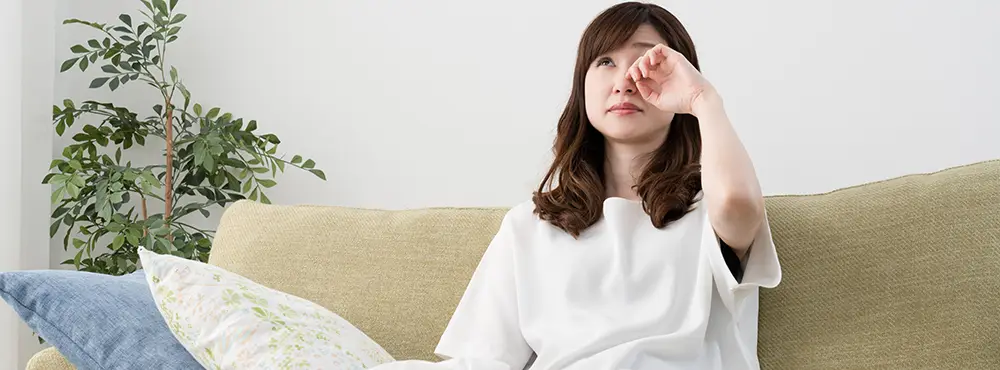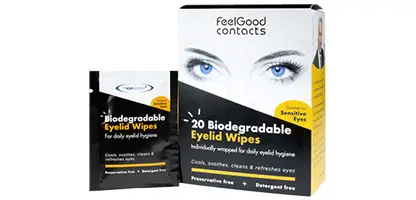Why does hay fever make your eyes itch?
Hay fever, which is also known as seasonal allergic rhinitis, causes the nasal passages, throat and eye membrane to become inflamed when your immune system reacts to the virus. Sensitivity to pollen in the air causes hay fever. It is commonly experienced during the spring season when the pollen count is high.
When the conjunctiva (a clear, thin membrane on the front surface of the eye) becomes inflamed, this sets off an allergic reaction which then causes watery, red or itchy eyes. Hay fever may also cause your eyes to feel gritty if the whites of your eyes swell up. Other symptoms of hay fever may include a runny or a blocked nose and sneezing. Nasal sprays are often used to treat these symptoms.
How do you get rid of itchy eyes from hay fever?
There is no cure for hay fever; however, there are various measures which you can take to get rid of itchy watery eyes during hay fever season. You can relieve the symptoms of hay fever with over-the-counter medications such as antihistamine nasal sprays and tablets. Here are some other ways to get rid of itchy eyes from hay fever.
Try an anti-allergy mask
An anti-allergy eye mask is an excellent end-of-the-day treat to soothe itchy eyes from hay fever and help you to sleep throughout the night.
The Eye Doctor Allergy is a cold eye compress that helps to relieve common symptoms of allergies and hay fever such as itchy eyes, headaches, puffiness and red eyes. Leave the eye mask in the fridge (or freezer for faster effect) for an hour or two and place the mask inside its cover. Place in cold water, then squeeze the excess water and place over your eyes for 10-20 minutes. The handy mask is reusable and will last you many uses.
How do you soothe itchy eyes?
Apart from trying an anti-allergy mask, you can also soothe itchy eyes from hay fever by keeping your eyes clean and free from pollen.
Use eye wipes throughout the day
While avoiding areas with grass and dense vegetation is a good idea, it can be challenging and generally unrealistic for most people when the sunshine calls. Even the worst hay fever sufferers want to enjoy the sun, although if your symptoms persist, it is mostly recommended you stay indoors.
Eye wipes such as the Eye Doctor Lid Wipes are a great way of removing pollen and other particles from the air that have built up around your eyes and on your eyelashes throughout the day.
The Eye Doctor Lid Wipes
- Gently clears away debris from eyes
- Fits comfortably in your bag, purse, or pocket
- Preservative free, they are gentle on even the most sensitive eyes
- Detergent free
- Particularly great for hay fever sufferers whose eyes get itchy and sore
How do I stop rubbing my eyes?
You can stop rubbing your eyes during hay fever season by putting into action the suggestions above to stop itchy eyes. Wearing sunglasses is also a good idea if you wish to stop rubbing your eyes.
Wear sunglasses
Sunglasses help create a barrier between eyes and pollens in the air, particularly when its windy and the air is moving. Wearing wraparound sunglasses will better enclose your eyes and stretch back past your temples, helping to stop pollens from reaching your eyes.
Wraparound sunglasses are also great for those who like to stay active and need a secure pair of frames when working out.
Sunglasses are also highly relevant as they protect your eyes from the sun's UV rays as the sun begins to make a more regular appearance. You should also check the pollen forecast daily to get an idea of how high the pollen count will be.
What's best for hay fever eyes?
You may want to switch to prescription glasses, if you usually wear contact lenses and if you suffer particularly badly from hay fever during the high pollen season. Build up, and deposits from dirt, debris and pollen on your contact lenses may contribute to itchy eyes during hay fever season.
If you would prefer to stick to contact lenses, you should wear daily contact lenses.
Wear daily contact lenses
Wearing a fresh new pair of lenses each day will offer more relief to your eyes than wearing a monthly lens. A silicone hydrogel lens such as comfi Pure 1 Day contact lenses will also ensure more moisture and oxygen movement through the lens.
Can I use allergy eye drops if I wear contact lenses?
It's best to check with your GP or pharmacist about antihistamine and anti-inflammatory products such as specialised anti-allergy eye drops to treat hay fever and soothe itchy eyes.
While antihistamines have a reputation for making people feel drowsy, this side effect is no longer a problem with new antihistamines. For some people a non-drowsy tablet during the high pollen count months is all that is required to keep their hay fever under control.
We hope our useful tips will help you get rid of itchy eyes from hay fever for good and you can enjoy the Spring and Summer months. Never suffer from itchy, sore and irritated eyes again.
Quick links:
A Guide to Hay fever
How to use eye drops
Top tips for contact lenses and allergies
Disclaimer: The advice in this article is for informational purposes only and does not replace medical care or an in-person check-up. Please check with an eyecare professional before purchasing any products or remedies. For information on our article review process, please refer to our Editorial Policy.

 Offers
Offers Account
Account
 Favorite
Favorite
 Basket
Basket

 OFFERS
OFFERS
















